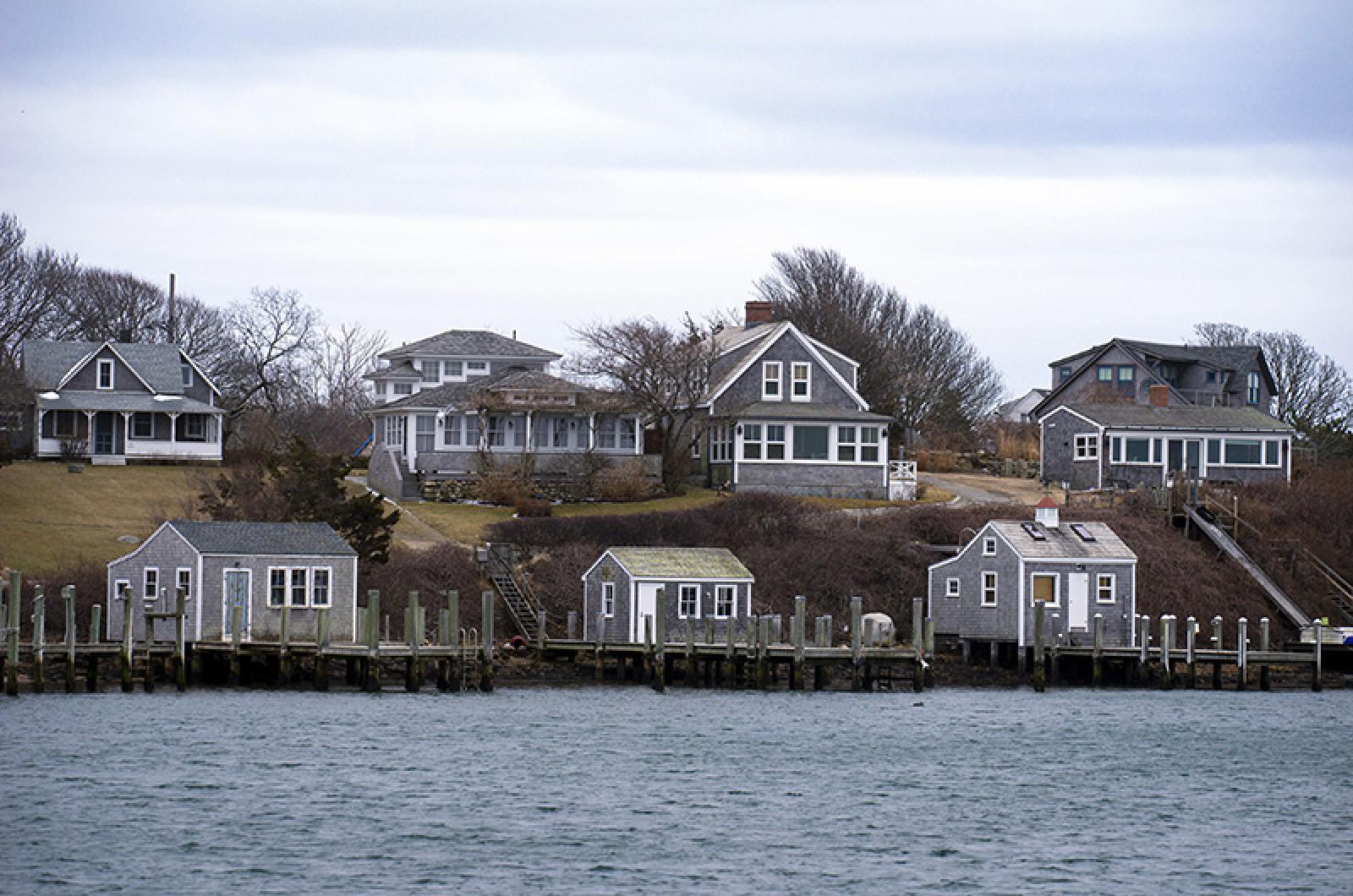More than 2,650 properties on Martha’s Vineyard have registered as short-term rentals since the state expanded its tax levy on lodging almost three years ago, generating about $16.5 million in revenue for Island towns so far.
All but about 100 of those are private homes and apartments that are rented by the day or week, according to a public registry maintained by the state Department of Revenue. The others include hotels, lodging houses and bed and breakfast establishments that rent more than four rooms. (B&Bs that rent three or fewer rooms are exempt).
Rental agents report that vacation rental bookings for the coming summer are soaring, with prices well up and inventory scarce. With surging demand as the pandemic recedes, tax receipts from short-term lodging are likely to grow exponentially in the coming years.
Yet as Island voters prepare to consider another proposed tax on housing when town meetings convene this spring, some Island towns are not maximizing the amount they could earn from this existing tax.
Towns in Dukes County have the option of imposing excise taxes of up to 6 per cent on short-term rentals, over and above the 5.7 per cent the state imposes. Additionally, there are two other local option room taxes available to towns, but for different reasons they have not been adopted on the Vineyard. Oak Bluffs, Tisbury and West Tisbury now charge 6 per cent; in Aquinnah, Chilmark and Edgartown, the local option tax is just 4 per cent.
After many years of debate, the short-term rental tax was signed by Gov. Charlie Baker in December 2018 and took effect with rentals starting on July 1, 2019. Short-term rentals are defined as rentals that last fewer than 31 days; year-round and longer-term rentals are excluded from the tax. People who rent their properties for fewer than 14 days per year aren’t required to pay the tax, but they still must register with the state.
The law, spurred by the growing popularity of Airbnb and other rental aggregators, expanded the longstanding rooms tax, which formerly was levied only on hotels and motels. In its first year, from July 1, 2019 through June 30, 2020, it generated $34 million in new revenue for the state and $32.8 million for Massachusetts cities and towns. Those amounts rose to $40.6 million and $37.5 million for the year ending June 30, 2021, according to state Department of Revenue figures.
Landlords are required to collect both the state and local taxes from their tenants and remit them to the state, which then gives the local portion back to the towns. The taxes are intended to be paid by renters.
When the short-term rental tax was first adopted, many rental brokers were concerned it would chill interest in the Vineyard by driving up prices. But Molly Valle, rental manager for Wallace and Co. in Edgartown, who handles about 100 properties that rent from $5,000 to $60,000 per week, said that has not come to pass.
“It really didn’t kill the market,” she said. “People are spending such a huge amount of money to come here . . . it really only affected the mid-range, and not that much.”
Ms. Valle said most places are fully booked, with limited availability left, and inquiries still pouring in. She said most Vineyard homeowners list their homes through multiple agencies, a practice Wallace and Co. encourages.
At WeNeedaVacation.com, a website devoted to short-term rentals on the Cape and Islands, Martha’s Vineyard advance bookings are up 37 per cent over this time last year, chief operating officer Jim Reese told the Gazette by phone.
He said they have seen a 127 per cent increase in vacationers over pre-pandemic years, while rental rates are up 10 per cent over 2020. That’s the highest increase the company has seen to date, compared with an average annual price increase of 2 to 3 per cent.
“Bookings continue to set exceptional numbers and set records we haven’t seen in our 25-year history,” Mr. Reese said.
Before the new law took effect, total receipts from the room tax on the Vineyard never exceeded $2 million a year. In its first year, ending June 30, 2020, the tax generated $3.4 million in local revenue, $1.5 million of which went to Edgartown and $1 million went to Oak Bluffs. For the year ending June 30, 2021, Island towns generated $5.4 million. And for the first two quarters of the current fiscal year, Island towns have already generated $7.5 million. (Receipts trail actual rental months, so the first two fiscal quarters — which follow the busy summer season — tend to be the most lucrative.) By comparison, Nantucket has generated almost $25 million from its 6 per cent tax since the law was expanded in 2019.
There are actually three local option lodging taxes available to towns, each requiring a majority vote at town meeting to enact. Any town in Massachusetts can impose a local option tax of up to 6 per cent; towns can also impose an additional 3 per cent “community impact fee” on multiple properties run by the same operator in a single town. And the law provides that towns in Barnstable, Nantucket and Dukes counties who opt into the Cape Cod and Islands Water Protection Fund can charge an additional 2.75 percent, with proceeds dedicated to water quality projects, though Vineyard towns are not yet qualified to participate.
For the basic local option tax, state law gives municipalities full discretion about how to use the revenue. Unless voters direct otherwise, the money goes to the town’s general fund.
When West Tisbury first voted to adopt a 6 per cent tax in 2019, an amendment was proposed at town meeting to earmark the funds for affordable housing, but voters turned it down.
“The thinking of the town is we can always use that money [in the general fund] for affordable housing,” said West Tisbury town administrator Jennifer Rand. “The voters decide.”
Edgartown town administrator James Hagerty said his town decided to take a conservative approach to the short-term rental tax until more historical data is available for analysis.
“We are going to wait to see some historic trends on this money prior to making a commitment [to increase it],” he told the Gazette.
“There’s a thought of leaving money on the table — yes and no,” Mr. Hagerty continued. “Maybe you are taxing some of these rental properties that have other unintended benefits. It’s a policy decision. We want to do our own review before we decide whether to increase it.”
He said typically five years of historic data are used to forecast for capital planning and other town projects.
For this year, he said the town plans to put $2 million of the money into a town stabilization fund that can be used for projects such as wastewater and climate change-related infrastructure needs, at the direction of voters.
“This money is very unreliable,” he said of the rental tax, noting that Edgartown actually took in less in September 2021 than it did in the previous September.
The community impact fee, designed to target professional property managers rather than individual homeowners, has been adopted by 21 Massachusetts municipalities ranging from the cities of Boston and Cambridge to the tiny hamlet of Egremont in the Berkshire hills. Under state law, not less than 35 per cent of the money collected from that tax must be used for affordable housing or local infrastructure projects. It is not clear how many rental properties on Martha’s Vineyard fit this criteria, but no Island town has adopted this tax.
Adam Turner, executive director of the Martha’s Vineyard Commission, said Vineyard towns should be able to participate in the Cape and Islands Water Protection Fund in the near future if they so decide. The fund was originally created to help pay for sewering on Cape Cod, a requirement that came out of a federal lawsuit against the EPA.
In order to participate, a town needs to have a section 208 [federal water quality management] plan or equivalent. Mr. Turner said Edgartown, Tisbury and Oak Bluffs are all in the process of writing comprehensive wastewater management plans. And he said the MVC has begun working on a 208 plan for West Tisbury, Chilmark and Aquinnah, using a $200,000 grant, that will address nitrogen pollution in the saltwater ponds up-Island.
An analysis done by the MVC in early 2019 found that that the Island had more than 11,000 vacant units of housing, of which 10,621 were estimated to be seasonal. The analysis went on to estimate that half of those — 5,310 — were short-term rentals. Using the local option tax rates that were in effect at the time (West Tisbury did not have any tax until July 2019), the MVC calculated that the law could generate about $6.8 million annually for the Vineyard.
As of March 2022, only about half the number of units estimated by the MVC have registered as required under the short-term rental law. Edgartown has by far the most on the Island. As of March 8, there were 934 registered rentals in Edgartown, in addition to 21 hotels, 18 lodging houses and five bed and breakfast establishments. Lodging houses are homes where four or more people rent individual rooms.
Oak Bluffs follows with 590 registered short-term rentals, 19 hotels, 11 lodging houses and four B&B establishments. Tisbury has 439 short-term rentals, 10 hotels, 10 lodging houses and four B&Bs. West Tisbury has 221 short-term rentals, two hotels, two lodging houses and five B&Bs. Chilmark has 275 short term rentals, three hotels and three lodging houses. Aquinnah has 93 short-term rentals and two hotels.
It is not known how many units of housing on the Island are actually rented on a short-term basis, in part because the number is constantly shifting.
Ms. Valle at Wallace and Co. said some people who used to rent have moved into their homes full time. “Because there is such huge turnover in property, a lot of our rental homes are no longer available,” she said. “We have a lot of repeat renters who are kind out of pushed out.”
But others who have recently purchased homes are entering the summer rental market. And while some homeowners will stick to the two-week minimum to avoid paying the short-term rental tax and reporting the extra income, there is also a trend among some homeowners to rent to people who want longer stays, she said.
“It changes every year, and is kind of a moving target,” Ms. Valle said.
And because the state relies on the honor system for landlords to register, there are likely to be scofflaws.
Since the rooms tax was expanded in Massachusetts, companies have sprung up who will track the number of short-term rentals to ensure the town is collecting the maximum amount of revenue. But Ms. Rand said West Tisbury has opted not to go that route.
“We are not doing that,” she said. “I’m sure there are some people who are not registering but the lost revenue is not enough to make it worth hiring another employee.”
Meanwhile, the demand for vacation housing on Martha’s Vineyard shows no sign of abating.
Mr. Reese of WeNeedaVacation reported a 100 per cent increase in new clients on its website this year.
Ms. Valle also noted that returning customers have been augmented by newly minted vacationers, most of them from New York, Connecticut, Massachusetts, New Jersey and California.
“The Vineyard has become very attractive . . . and it’s becoming more of a Nantucket-like group of people,” she said.
Corrected from an earlier version which reported that rental rates are up 127 per cent at WeNeedaVacation.com. The correct number is 10 per cent; vacationers booking with the site are up 127 per cent over pre-pandemic years.









Comments (41)
Comments
Comment policy »